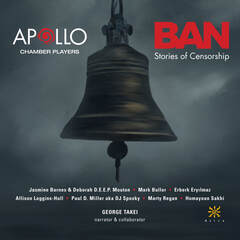Dieses Album befasst sich mit dem Thema ‘Ban, Stories of Censorship’, und auch wenn die Komponisten eher zurückblicken, ist das Thema, wie wir wissen, heute aktueller denn je.
Das Programm beginnt mit Marty Regans The Book of Names, einem elegischen Streichquartett, das an die Verhaftung von 125.181 Amerikanern japanischer Herkunft erinnern soll, die im Zweiten Weltkrieg in den USA eingekerkert wurden. Das Stück ist einmal mit und ohne Text zu hören.
Das zweite Werk, Ban, von Allison Loggins-Hill, reagiert mit einer erregt-nervösen Musik auf die Zensurierung von Büchern in den USA.
Der überwiegende Teil der Buchverbote betrifft weiterhin Geschichten von und über Leute mit farbiger Haut und Personen aus dem Bereich LGBTQ+.
Das Streichquartett Firewall von Mark Buller befasst sich in vier Sätzen mit demselben Thema in intensiven wie auch elegischen Passagen. Es ist ein sehr bewegendes, wunderbar komponiertes und packend gespieltes Quartett.
Revise? von Jasmine Barnes (Musik) und Deborah D.E.E.P. Mouton (Text) erforscht die Auslöschung von Identität, Geschichte und Kultur. Die Autoren sagen: « Wir befinden uns in einer aktuellen Krise, was die Auslöschung von Afroamerikanern in Geschichtsbüchern, in der Literatur, in den Ursprüngen der Kunst, Kunstformen und vielen anderen Bereichen angeht, was die Frage aufwirft, ‘wie lange, bis es nichts mehr zu sagen gibt?’. » Es ist ein ergreifendes Stück über die Geschichtsrevision, wie sie von der Trump-Administration vorgenommen wird.
Arman (Hope) für Streichquartett, Rubab & Tabla von Homayoun Sakhi, geht es um die Hoffnung, die das afghanische Volk inmitten von Repression aufrechterhält.
Der Komponist sagt « Arman ist sowohl ein Klagelied über den verlorenen Frieden als auch eine Vision für die Erneuerung, Symbol für den beständigen Geist eines Volkes, das sich nicht nur sich nicht nur durch ihre Kämpfe, sondern vielmehr durch ihre Träume von Gerechtigkeit, Würde und Freiheit », und das in einem Land in dem gegenwärtig Musik verboten ist.
Quantopia/The Thought Police (2025) von Paul D. Miller aliads DJ Spooky, » ist meine klangliche Antwort auf das Zeitalter der Post-Wahrheit. Orwells 1984 ist keine Fiktion mehr – es ist ein Spiegel. Fake News verbreiten sich schneller als Fakten, und die Gedankenpolizei fühlt sich weniger wie eine Dystopie und mehr wie das tägliche Leben an. (…) Meine Musik und meine Arbeit kanalisieren diese Spannung, und diese Komposition versucht, kulturelle Grenzen zu überschreiten, indem sie eine collageartige Herangehensweise an den Klang verfolgt. »
Das Programm endet mit Sis Çanı / Fog Bell, einem düsteren Stück mit alarmierenden Klängen, das auf die Unterdrückung der Demokratie in der Türkei hinweist.
This album deals with the theme ‘Ban, Stories of Censorship’, and even if the composers tend to look back, we know that the topic is more relevant today than ever.
The program begins with Marty Regan’s The Book of Names, an elegiac string quartet intended to commemorate the arrest of 125,181 Americans of Japanese descent who were incarcerated in the USA during the Second World War. The piece can be heard once with and without text.
The second work, Ban, by Allison Loggins-Hill, reacts to the censorship of books in the USA with agitated and nervous music.
The majority of book bans continue to affect stories by and about people of color and LGBTQ+ people.
The string quartet Firewall by Mark Buller deals with the same theme in four movements with both intense and elegiac passages. It is a very moving, wonderfully composed and grippingly played quartet.
Revise? by Jasmine Barnes (music) and Deborah D.E.E.P. Mouton (text) explores the erasure of identity, history and culture. The authors say, « We are in
a current state of crisis as it pertains to erasure of African Americans in history books, literature, origins of art forms and so many other spaces, which poses the question, ‘How long until there’s nothing left to quiet?' » It’s a poignant piece about the revision of history as undertaken by the Trump administration.
Arman (Hope) for string quartet, rubab & tabla by Homayoun Sakhi, is about the hope that the Afghan people maintain in the midst of repression.
The composer says » Arman emerges as both a lament for lost peace and a vision for renewal, symbolizing the enduring spirit of a people who refuse to be defined solely by their struggles but rather by their dreams of justice, dignity, and freedom » in a country where music is currently banned.
Quantopia/The Thought Police (2025) by Paul D. Miller aliads DJ Spooky, « is my sonic response to the age of ‘post-truth.’ Orwell’s 1984 isn’t fiction anymore – it’s a mirror. Fake news spreads faster than facts, and the Thought Police feel less like dystopia and more like daily life. I was inspired by how Orwell exposed power’s manipulation of language and memory. Today, algorithms curate our reality and stupidity – profitable, viral stupidity—undermines democracy. Bonhoeffer called it the most dangerous force of all. My music and work channels that tension, and this composition seeks to traverse cultural boundaries, embracing a collage-like approach to sound. »
The program ends with Sis Çanı / Fog Bell, a somber piece with alarming sounds that points to the suppression of democracy in Turkey.





















